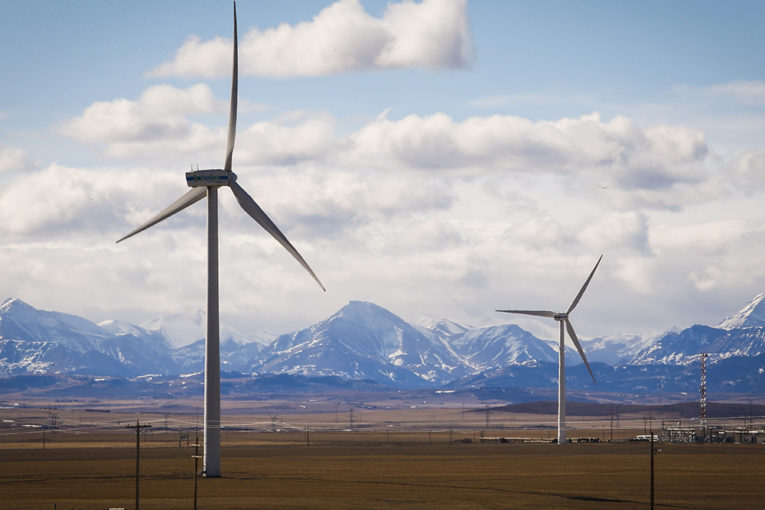
How low can renewable energy prices go?
That will be the billion-dollar question for Albertans when they find out Wednesday which projects have been selected by the NDP government in the first auction for renewable power contracts.
Not only will Albertans be told which of the 29 projects up for consideration have been selected but also where they will be built — and at how low of a price they can supply wind or solar energy to the province’s power grid.
“The prices are going to be a lot lower than people expect,” said electricity expert Duane Reid-Carlson, chief executive of consultancy EDC Associates.
“I wouldn’t be surprised to see something sub-$50 per megawatt-hour (MW-h). People want to get in and win.”
Premier Rachel Notley, Energy Minister Marg McCuaig-Boyd and Environment Minister Shannon Phillips will be on hand in Calgary to make the announcement, signifying the importance of the event to their overall climate plan.
The NDP government is moving ahead on its goal to phase out all coal-fired electricity in the province by 2030, while expanding renewable power to make up 30 per cent of total generation.
For months, the government has been pounded by critics who warn Alberta is driving up long-term costs for consumers by overhauling its electricity sector.
But the first test will be the power prices the competitive auction garners, which will lay the groundwork for just how big any subsidies will be for these projects.
The province wants renewable electricity to grow to about 5,000 megawatts of power capacity by the end of the next decade. To do that, Alberta needs to attract at least $10.5 billion in investment.
In the first of several renewable auctions, multiple projects will be selected to supply up to 400 MW of clean power to the grid by December 2019.
It’s widely expected all of the winning projects will be wind developments.
“The bidding was pretty competitive,” Cheryl Oates, the premier’s spokesperson, said Tuesday. “When things are more competitive, you get a better price.”
So far this year, the average electricity price in Alberta has remained deeply depressed, averaging only $22 per megawatt-hour. That’s a far cry from 2013, when prices averaged $80 per MW-h.
Through its new program, the government will create a renewable energy credit to provide top-up payments to the winning developers, if they’re needed.
The credit will cover the difference between the bidder’s price and Alberta’s wholesale power prices, meaning low wholesale prices for electricity in the years ahead will require larger subsidies to the operators.
However, if prices rise during the 20-year contract above the renewable bidder’s price, developers will have to credit the difference back to the government.
At an energy conference last month, Scott Thon, CEO of AltaLink, predicted aggressive competition in the first renewable auction should keep rates low.
“You are going to see in this auction . . . prices at least in the $40s per megawatt-hour, now maybe even less,” Thon, who is also chairman of the Canadian Electricity Association, said at Insight Information’s Alberta Power Summit.
One source confirmed prices for the winning bidders will come in below $40 per megawatt-hour, on average.
Wednesday’s announcement also comes as Alberta electricity prices are expected to more than double in the coming year because of improving demand, higher provincial carbon taxes, some older coal-fired generating units being mothballed and the Balancing Pool terminating unprofitable power contracts.
Earlier this week, EDC raised its forecast electricity price to between $52 and $57 per megawatt-hour in 2018 and 2019, and into the $56 range in 2020.
EDC previously estimated the cost of provincial subsidies for the entire renewable energy program would range between $4 billion and $8 billion by 2030. The final number will likely fall in the lower part of the spectrum, Reid-Carlson said.
But there are other factors for Albertans to consider than simply the price of electricity in these contracts, such as the reduction of greenhouse gas emissions that will come from the transition to greener power.
Since the wind doesn’t always blow and sun doesn’t always shine to generate clean energy, Alberta will have to back up some renewable power to ensure the lights stay on, said United Conservative Party MLA Don MacIntyre.
The province is also paying generating companies more than $1 billion to close down coal-fired stations, he added.
“We have got some fine print that is going to make it a lot more expensive than the price that will be advertised in the (government) news release, so buyer beware,” MacIntyre said.
However, the wind energy industry believes Alberta will see the lowest renewable power prices the country has ever seen.
A recent report by investment bank Lazard noted that since 2009, the cost of wind energy has dropped by two-thirds because of efficiency gains.
Technology has improved, larger turbines are being built and longer blades capture more of the resource, said Robert Hornung, president of the Canadian Wind Energy Association.
The cheapest price for wind power procured by a province came in at $63 per megawatt-hour in Quebec five years ago. Hornung is confident Alberta’s prices will be lower.
“Wind has arrived, it’s mainstream and it is cost competitive,” he said.
“Alberta has a tremendous wind resource relative to other parts of the country and it’s largely untapped.”
The province already has about 1,500 MW of installed wind power capacity and that number is poised to grow.
On Wednesday, we’ll find out what it will cost to make that happen.
Chris Varcoe is a Calgary Herald columnist.
You can read more of the news on source
